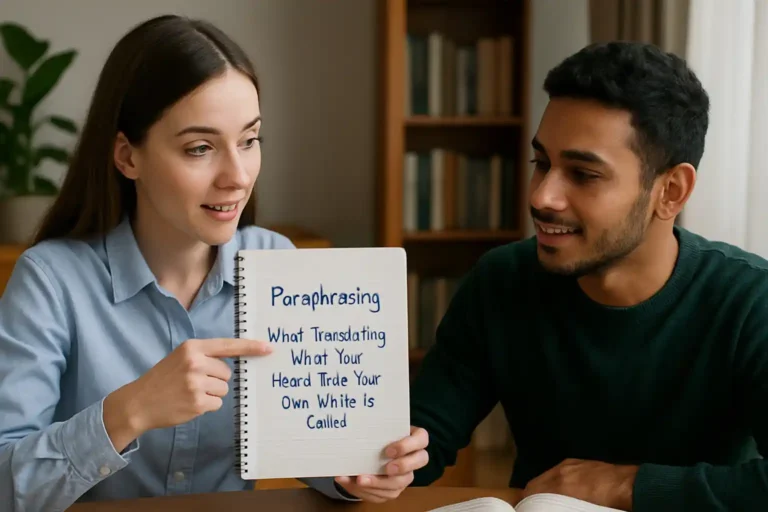Why Paraphrasing Is a Key to Real English Understanding
Translating what you heard into your own words is referred to as paraphrasing, and it’s one of the most important skills in learning English. In fact, paraphrasing is the bridge between hearing and understanding. It helps you turn what you hear into something you truly understand.
Many learners focus only on repeating or memorizing, but real communication needs active listening skill and the ability to explain things in your own way. That’s why using a solid paraphrasing technique is essential for conversations, presentations, and writing.
Here’s why paraphrasing boosts comprehension:
🧠 It proves you actually understood what was said
🔍 It sharpens your ability to summarize in your own words
🎓 It strengthens vocabulary and sentence structure naturally
This skill makes you more confident in both listening and speaking. And if you need spelling support, don’t miss How to Spell 12 in Words Correctly and Easily to polish foundational writing.
Table of Contents
What Does “Translating What You Heard Into Your Own Words” Really Mean?
In English learning, translating what you heard into your own words is referred to as paraphrasing. But what does that actually mean?
Paraphrasing is more than just repeating; it means taking a message and rewording it to show that you really understood. It shows your listening comprehension skill is active, and that you can think in English—not just translate from your native language.
Here’s how to think about it:
🤔 You hear something like: “We need to finish this report by Friday.”
🧑 You paraphrase: “They want us to complete the report before the weekend.”
That’s paraphrasing in action! It’s one of the best English learning strategies because it makes language practical. You don’t have to remember exact words—you remember the idea.
You can sharpen this through paraphrasing techniques like summarizing short clips, rewriting notes, or retelling stories in your own way.
Want to speak more confidently from day one? Try How to Introduce Yourself in Class 6 Tips to Feel Confident to get comfortable with sharing who you are.
And for business learners, Master Business English in 2025: Vocabulary, Idioms, and Conversations offers real-world speaking tools.

5 Common Situations Where Paraphrasing Helps in Speaking English
You might be wondering when you should use paraphrasing. Here are five situations where translating what you heard into your own words is referred to as the key skill to keep a conversation going smoothly:
💬 In discussions or group talks – when you want to confirm what others said.
🧵 During phone calls – to restate what the speaker means without seeing them.
📈 At work meetings – to show understanding and ask clarifying questions.
🚪 In interviews – to explain questions before answering.
🏥 At the doctor’s office – to confirm instructions clearly.
All these moments use active listening skills, and practicing summarizing in your own words boosts your listening comprehension skill every time.
Need help with grammar clarity in these situations? Visit Speak To or Speak With 5 Simple Grammar Rules to Remember for an easy breakdown.
How to Practice Paraphrasing Effectively
Learning the definition is good, but building the skill is better. So let’s look at how to practice. Remember, translating what you heard into your own words is referred to as paraphrasing, and you can improve this with the right methods.
Try these exercises:
🔁 Watch a 2-minute video, then explain what you understood
🏃 Read a short paragraph and retell it using different words
🎮 Record yourself paraphrasing podcast clips
These combine the power of English learning strategies, paraphrasing techniques, and active listening skills to lock in comprehension.
Want to challenge yourself? Read Is Korean Hard to Learn for English Speakers 7 Key Facts to practice paraphrasing new content.
Also, explore the english language itself to see how it evolved and why paraphrasing is so important.

Useful English Phrases to Help You Paraphrase Naturally
Let’s make paraphrasing even easier. Here are phrases you can use when you’re not sure how to rephrase someone else’s sentence.
✨ Use these sentence starters:
“So you’re saying that…”
“In other words…”
“What I understood is…”
“If I got it right, you mean…”
These help you summarize in your own words smoothly. They also show others that you’re actively listening, which supports your listening comprehension skill and overall English learning strategy.
Want to explore how this works in multilingual settings too? Check out How to Say Do You Speak English in Spanish 5 Easy Ways to expand your communication skills.
Paraphrasing as an Active Listening Skill
Now let’s go deeper. Paraphrasing isn’t just helpful—it is a core active listening skill. That means you’re not just hearing words but truly receiving the message.
Here’s how to know you’re paraphrasing well:
🤔 You can restate a speaker’s idea in your own sentence.
📄 You do it naturally in daily conversations.
😊 You help clarify for others when needed.
Strong paraphrasing techniques build this habit. Even pausing during a conversation to say, “Let me see if I understand…” shows you’re applying the skill.
It also supports your ability to summarize in your own words, which is key in study groups, note-taking, and working in English-speaking environments.
How Paraphrasing Builds Confidence in Speaking English
Finally, here’s the best part: translating what you heard into your own words is referred to as paraphrasing, and it leads directly to more confident English speaking.
When you don’t worry about exact grammar or vocabulary, you start focusing on meaning. This is the mindset of fluent speakers!
Paraphrasing boosts your:
🧠 Listening comprehension skill
📁 Vocabulary expansion
✅ English learning strategy for fluency
Even beginners feel more comfortable speaking when they use this technique. It’s like having a safety net when you can’t remember the exact words.
Need help applying these strategies? Contact Us and let us support your confidence-building journey!
Related Posts

Do People in Turkey Speak English What You Should Know
Do people in Turkey speak English Learn where English is spoken and how easy it is to communicate as a traveler

Can You Speak English How to Ask and Answer Politely
Can you speak English Learn the best ways to ask and respond to this question politely in different travel and social settings

7 Books to Expand Your English Vocabulary Fast
Books to expand vocabulary help you speak and write better Discover top books that make learning new words enjoyable
